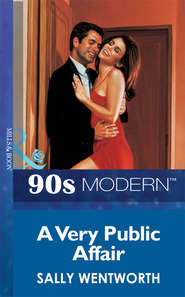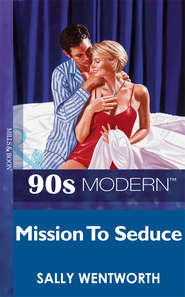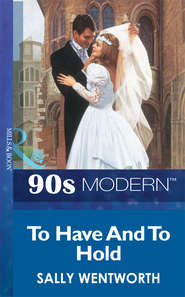По всем вопросам обращайтесь на: info@litportal.ru
(©) 2003-2024.
✖
Shadow Play
Автор
Год написания книги
2018
Настройки чтения
Размер шрифта
Высота строк
Поля
‘Yes, but for the love-affair to have gone on for so long without the heroine realising who her secret lover was? It’s hardly credible.’
‘Maybe in her heart she did know but didn’t want to believe it. She didn’t want to spoil what was perfect.’
‘Perhaps you’re right. It’s certainly very sensitively written.’
‘And that sensitivity is what I want to come over in the adaptation,’ Nell said earnestly. ‘I don’t want this to be just another serial with explicit sex scenes—bare limbs all over the place and moans and groans in the appropriate places. This is a romance in the true sense of the word. That’s the way it’s got to be treated if it’s going to be successful.’
‘Are you implying that I can’t handle that?’
She drew back, realising that her vehemence could have sounded like an accusation. ‘Not at all. I’ve watched the Eastern Trilogy again; you handled that really well.’
‘Again?’
‘I got the tapes out of the television film library to watch last weekend,’ she admitted.
‘Checking up on me?’
‘Doing my homework.’
Ben nodded. ‘Fair enough. But this book differs a great deal from the trilogy. There’s deep passion here as well as romantic love. Earthy, physical passion. That’s what makes the book, and will make it interesting to the viewers. You can’t cut it out.’ He paused, waiting for her to speak, but when she didn’t Ben went on, ‘It needs to be delicately handled to combine the two, but I think we should be able to do it.’
Nell didn’t comment on that, instead reaching out for the book. ‘Shall we make a start?’
‘OK. The first thing to decide is how many episodes.’
‘Max said he couldn’t get money for more than three of one hour.’
‘That should be enough. It will give us an opportunity to express the length of time covered in the book. It’s about twelve years, isn’t it?’
‘Twelve winters.’
‘Yes.’ Ben gave her an appraising look. ‘You’re very obsessed with this story, aren’t you?’
‘I told you; I’ve been working on it for a year.’
‘And you’ve started to identify with the heroine,’ he said shrewdly.
‘You’re supposed to identify with the characters when you read a book.’
‘But not when you’re adapting it for television. You have to have a clear mind; to be able to cut where necessary, not to be so involved with it that you can’t bear to lose a line of dialogue because you’re in love with the characters.’
It was said bluntly, almost rudely, and made Nell angry. ‘I have adapted books before,’ she pointed out coldly.
‘I know; I did my homework, too. But never a full-blooded love story, have you?’
Her mouth tightened. ‘I am not in love with the characters,’ she answered shortly. ‘The whole idea is ridiculous.’
‘Good,’ Ben said smoothly. ‘Then you won’t mind making any necessary cuts.’
She gave him a glare, knowing that she’d been outmanoeuvred. ‘Shall we get on with it?’
His lips twisted slightly. ‘All right. The next thing is to decide where the episodes will end. Now, the basic storyline is of a young girl, Anna, who is married off, in the mid-nineteenth century, to an older man she doesn’t love, a man she finds cold both physically and emotionally. Not a rotter, not unkind, just unable to rouse any feelings in her. They don’t have any children. Then one winter she goes alone to visit her parents but on the way back the carriage gets caught in a snow storm and she has to take shelter in the nearest house, which is inhabited only by a couple of servants who say that their master seldom comes there any more.’
Ben picked up the synopsis, glanced at it, then went on, ‘They give her the master bedroom and the first night nothing happens, but one of the horses has slipped and hurt its leg, so she has to stay on. The second night she feels very tired, and while she’s in bed she has a dream in which a man makes love to her. The most perfect, wonderful experience she could ever have imagined. The next day her husband turns up to look for her and everything is back to normal. But she treasures the memory of the dream, especially when she finds she is pregnant at last—but her husband hasn’t recently made love to her.’
‘She wouldn’t have thought of it as making love, not with her husband,’ Nell interrupted with certainty.
‘No. The act of procreation, then. So she thinks maybe it wasn’t a dream, maybe it was true. Anyhow she lets the husband into her bed, just in case, but finds his attentions even more abhorrent now— Is that the kind of language that suits you?’ Ben broke off to ask Nell.
Missing the slightly dry note in his tone, she nodded. ‘Yes, that’s how she would think.’
‘OK.’ He put his elbows on the table and pyramided his hands. ‘The child is born, a girl, but the husband still needs an heir, which isn’t forthcoming. So, two years later, in the depth of winter, she goes to visit her parents again, and ends up at the same house. Again the man comes to her and they make love, but on both nights this time. Again she seems to be in some strange kind of dreamlike state while it’s going on, but she knows it’s true because she sees the marks of his hands on her body the next day.’
‘Anna gets pregnant again, and this time she has a son.’ Nell took over. ‘She becomes desperate to find her lover and when her husband goes away on business she goes to the house to find him. But the house is closed up and empty, and no one can tell her whom it belongs to. She thinks that she’s lost him and is terribly sad, but when she passes that way the next winter she calls there out of sentimentality, and to her joy finds everything the way she first remembered: the same servants, the place warm and inviting, the same bed...’
‘And the same lover,’ Ben finished for her. ‘She begins to suspect that perhaps her food or drink was drugged before, so has nothing. She leaves the lights burning in the room, wanting to see her lover’s face, but it’s a big old-fashioned four-poster bed with heavy curtains all round, he blows out the candles and she doesn’t see him. She tries to talk to him, though, but he silences her with kisses, exhausts her with love, and when she wakes he’s gone. Afraid that by trying to see him she might have lost him, that night she drinks and eats, and again it’s like a dream when he comes to her.
‘So every winter she goes back. She has two more children but one of them dies. She is distraught and her husband can give her no comfort. It’s summer, but she goes to the house anyway, finds it empty as before. She sleeps on the bed and this time feels the warmth of his arms, his strength and love and is comforted for her loss. She leaves a locket behind with a picture of her dead child in it.’
Nell, unable just to sit and listen, took up the story again. ‘Anna has a child to take the place of the one she lost, again by her lover. Twelve years have passed. Then her husband is killed in an accident, and although she’s sad for him she’s filled with happiness at her freedom, because now she’ll be able to go and find her lover, be with him always.’ She paused, her face becoming sad. ‘Then her husband’s possessions that he was carrying when he was killed are sent to her—and she finds the locket. And she knows the truth, and knows that she has lost not only her lover, but all the years of happiness together if she had only know the truth before.’
‘I don’t agree there,’ Ben said matter-of-factly, breaking in on her sad sentimentality. ‘If she’d realised the first time who he was, it would have been a coupling just like all the others before, and she’d never have thought that she had a phantom lover. It was the secretiveness of the affair that aroused and fed her sensuality. She’d have gone on being lonely and unfulfilled—unless she’d been driven to have an affair with the stable-boy or some other available man.’ He grinned at Nell’s indignant look. ‘Lots of women were driven to that in those days, you know; either that or turning to religion and doing good works whether the poor liked it or not.’
‘That’s hypothetical,’ Nell pointed out. ‘The story finishes with her finding out it was her husband all along and being sad; we don’t have to worry about what might have been.’
‘How logical.’ Ben looked round. ‘Did Max say there were the tools for making coffee somewhere?’
‘Yes, he did,’ Nell answered, but didn’t get up to look.
Ben glanced at her and grinned. He went over to the cupboard, found a kettle and cups, packets of coffee, sugar and powdered milk. ‘All we appear to be short of is water,’ he remarked. ‘Where do we get that, I wonder?’
Satisfied she’d made her point, Nell stood up. ‘I noticed a cloakroom just along the corridor; I’ll get some from there.’
‘Thanks.’
But the water in the cloakroom wasn’t suitable for drinking and she was directed to another place on the next floor. It was almost ten minutes before she came back, and Ben was sitting on the settee, the phone in his hand, his feet up on the arm. The light from the window was behind him, outlining his profile, and for the first time Nell noticed its hardness, the leanness of his jawline and the good bone-structure. He could, she supposed, be considered good-looking, attractive to women, and wondered why she hadn’t noticed before. Because she’d been too tense, probably, too worried about having to work with him, and what he would want to do with her precious story. The latter was still undecided, perhaps still to be fought over, but she felt more relaxed with him now, more able to think of him as a man.
‘But surely you can manage,’ he was saying. ‘It’s only for a few days.’ He listened, then gave a resigned sigh. ‘OK, OK, I’ll get back as soon as I can and we’ll talk it over then. Yes, I do understand. Yes. Goodbye.’
Nell had been busying herself with the coffee, but looked round to say, ‘Milk and sugar?’
‘What?’ Ben had been gazing moodily out of the window. ‘Oh—one sugar, no milk.’
She handed him a cup. ‘I take milk and sugar,’ she told him. He frowned, not with it. ‘So you’ll know when it’s your turn to make the coffee,’ she supplied.
His mouth crooked a little but there was obviously something else on his mind. ‘I’ll try and remember.’
Sitting down at the table again, she stirred her coffee and said, ‘I think the first episode ought to end after her first night with her lover.’











